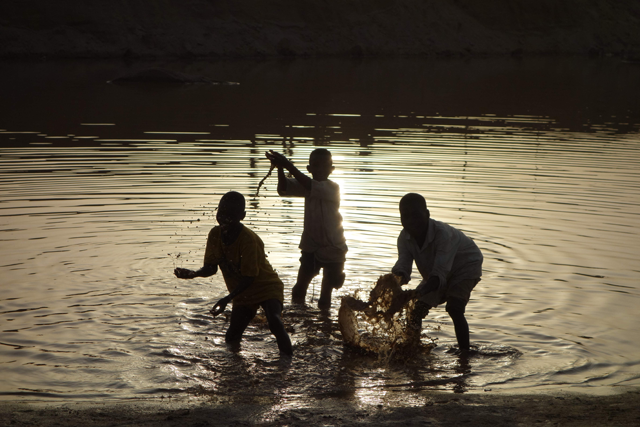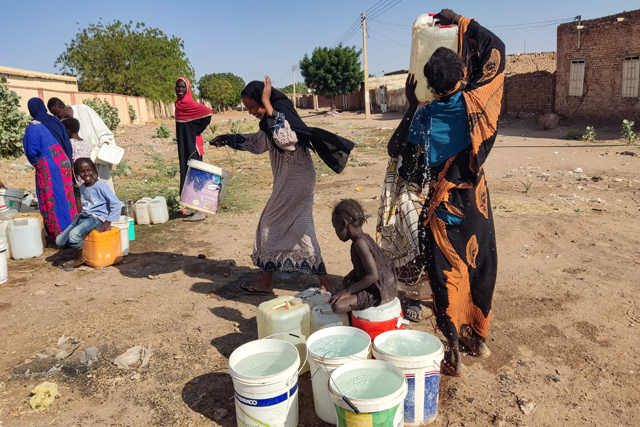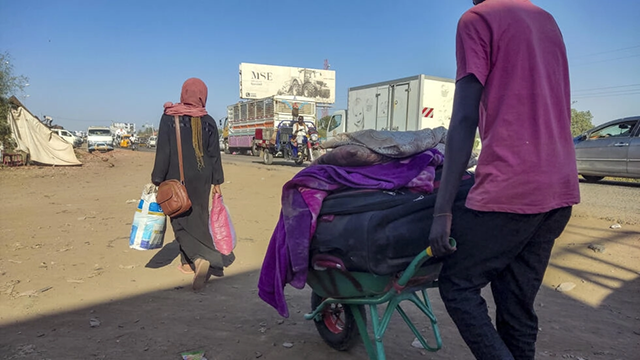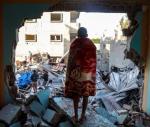You are here
Sudan committee says at least 104 killed in village attack
By AFP - Jun 07,2024 - Last updated at Jun 07,2024

Men walk carrying a large bowl of food each, as Sudanese families host internally displaced people coming from the central Sudanese state of Gezira to the eastern Sudanese city of Gedaref on June 3 (AFP photo)
PORT SUDAN, Sudan — A Sudanese pro-democracy activists' committee Thursday reported "more than 104" dead in a single day when paramilitary forces attacked a village, as the UN warned of mass displacement and starvation.
The Rapid Support Forces (RSF), which have been at war with the regular army since April 2023, on Wednesday attacked the central village of Wad Al Noura in Al Jazira state "in two waves" with heavy artillery, the Madani Resistance Committee said.
It reported on Wednesday that the feared paramilitaries had "invaded the village", causing dozens of casualties and widespread displacement.
The attack "claimed the lives of more than 104 martyrs" and "injured hundreds" said the committee, one of hundreds of similar grassroots groups across Sudan, adding that it reached the toll via "initial communication with village residents".
On social media, the committee shared footage of what it said was a "mass grave" in the public square, showing rows of white shrouds laid out in a courtyard.
In a little over a year, the war has killed tens of thousands of people, including up to 15,000 in a single West Darfur town.
However, the war’s overall death toll remains unclear, with some estimates of up to 150,000, according to US special envoy for Sudan Tom Perriello.
The RSF has repeatedly besieged and attacked entire villages across the country, and has been notorious for widespread looting as well as sexual and ethnic violence.
In a statement late Wednesday, the RSF said it had attacked three army camps in the Wad al-Noura area, and clashed with its enemy “outside the city”.
The resistance committee called the RSF’s statement an “expected” attempt to “criminalise the people of Wad al-Noura and label them a legitimate target”.
It also said the villagers had “called for help from the armed forces, which did not respond”.
The military has not issued an official comment, but Sudan’s ruling sovereignty council, under army chief Abdel Fattah Al Burhan, called Wednesday’s attack a “heinous massacre of defenceless civilians”.
The army has come under repeated criticism from Sudanese civilians for “abandoning” them and retreating in the face of RSF offensives, particularly in Al Jazira and the western Darfur region.
Both the army and the RSF — commanded by Burhan’s former deputy Mohamed Hamdan Daglo — have been accused of war crimes, including targeting civilians, indiscriminately shelling residential areas and looting or obstructing humanitarian aid.
The Emergency Lawyers, a pro-democracy group of volunteers who document the war’s atrocities, said on Thursday the attack on Wad al-Noura was a “war crime” and called on the international community to “exert pressure” on both sides to abide by international law.
‘Looming famine’
The UN migration agency warned on Thursday that internal displacement figures in Sudan could “top 10 million” within days.
Since the war began, more than 7 million people have fled their homes for other parts of Sudan, adding to 2.8 million already displaced from previous conflicts in the war-torn country of 48 million inhabitants.
“The world’s worst internal displacement crisis continues to escalate, with looming famine and disease adding to the havoc wrought by conflict,” the International Organisation for Migration said in a statement.
Across Sudan, 70 per cent of those displaced “are now trying to survive in places that are at risk of famine”, it added.
The UN says 18 million people in Sudan are acutely hungry, with 3.6 million children acutely malnourished.
Widespread hunger has haunted the country for months, while aid agencies say a lack of data has prevented the official declaration of a famine.
If the current humanitarian situation continues, 2.5 million people could die of hunger by the end of September, according to recent estimates by the Clingendael Institute, a Dutch think tank.
That figure is “about 15 per cent of the population in Darfur and Kordofan”, the country’s vast western and southern regions which have seen some of the worst fighting, the institute said.
Related Articles
PORT SUDAN, Sudan — Pro-democracy activists in Sudan reported Friday about 40 dead in "violent artillery fire" the previous day when paramil
PORT SUDAN, SUDAN —Two days of fighting between Sudanese rivals have forced an estimated 10,000 families to flee a famine-hit displace
AL JAZIRA STATE, Sudan — On a countryside road in battle-ravaged Sudan, the hum of a passing vehicle turns villagers' blood cold, fearing th



















